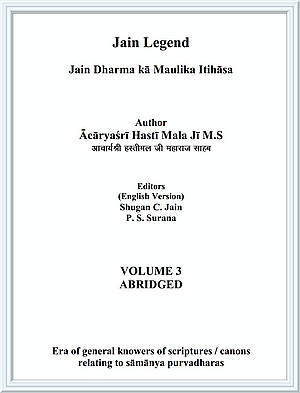Jain religion means the path of beneficence and true peace for all living beings. Literal meaning of dharma / religion is an entity or code of conduct which protects all living beings from drowning in the ocean of birth-death-birth with associated pains and miseries. The religion propagated by totally detached, omniscient and omnipresent Jinendra Deva is called Jainism.
The true nature of religion had been described by Lord Mahāvīra after he attained pure intuition and pure knowledge, became a Tīrthaṃkara and established the four fold congregation of followers as, 'I say that all the Arihantas or omniscient of the past, present and who are likely to become so in future, promulgate and propagate the following religion':
'All living beings, be they with one sense i.e. have air /water /earth/ fire or vegetation as their bodies or mobile living beings i.e. with two to five sense organs, should not be slain, nor should be ordered to be slain. Further they should not be forcibly enslaved, not tortured, and should not be attacked lethally'.
This nonviolence based religion is true, pure and eternal religion as indicated by those who know the suffering of all living beings, be they one sensed immobile (i.e. earth, air, water, fire or vegetation bodied) or mobile beings (two to five sensed living beings all grouped as Ṣaḍjīvanikāya in Jainism. An ancient and true saying is, "Those people; who are keen to learn the sermons or even to do so, either present or absent, knowledgeable or ignorant of the punishments of mind, body and speech; should always listen to this nonviolence based religion as this is the true path of attaining liberation. The supreme and undisputable nature of the religion based on nonviolence has thus been described this way".
Lord Mahāvīra has clearly said in Ācārāṃga Sūtra "Violence, regardless of its being committed for livelihood, enjoyment, religion or even to get rid of the pains associated with birth, old age or death i.e. to attain liberation, is always harmful and is the cause of ignorance (lack of knowledge)".Unlike the Vedic tradition which does not consider animal sacrifice for religion as violence; Jainism does not consider so. In Jain scriptures it has been clearly said that, 'If some extraordinary power had to be used for the protection of the congregation, then the same should be absolved by performing self-criticism (ālocanā) and ritualized confession (pratikramaṇa). The true nature of Śramaṇa's practice and conduct in Jainism had been succinctly and crisply given in the sixth chapter 'Mahācāra' of Daśavaikālika Sūtra.
The progressive and difficult path of spiritual purification for those who are serious and very keen to continuously progress on the path of self-purification had been given in Jainism and not traceable in any other religion now or will never be found elsewhere in future. The code of conduct for Jain monks includes the following eighteen steps;
| 1-5 | five major vows, namely, nonviolence, speaking the truth, non-stealing, non-possession and celibacy. |
| 6 | Not eating or taking any food after sunset. |
| 7-12 | protecting the lives of six types of living beings (Ṣaḍjīvanikāya) i.e. one sensed with air, water, fire, earth or vegetation as their bodies or mobile living beings with two to five senses. |
| 13 | Not to accept any non-essential things. |
| 14 | Not to accept food or water in the utensils belonging to a householder. |
| 15 | Not to sit on a seat belonging to a householder |
| 16 | Not to sit or sleep on a bed. |
| 17 | Not to take a bath |
| 18 | Not to decorate his / her body in any manner. |
All the above steps had to be practiced fully and not partially or with any laxity by all monks, be they young, old, women or sick. No flaws or relaxations are permissible in the above steps. Those detached monks, who practice the above eighteen steps of the conduct of śramaṇas along with full knowledge of nonviolence towards all types of living beings, practitioners of seventeen types of self-restraint, devoid of elusion and totally detached, observe simplicity and twelve types of austerities annihilate the bonded karmas and do not bind new karmas thus destroying the impurities (karmas) associated with their souls completely. In the end, like the full moon in its full glory, they either attain liberation from the transmigration cycle or are born in the highest heavens if some impurities still stay with their souls.
 Acharya Hasti Mala
Acharya Hasti Mala
